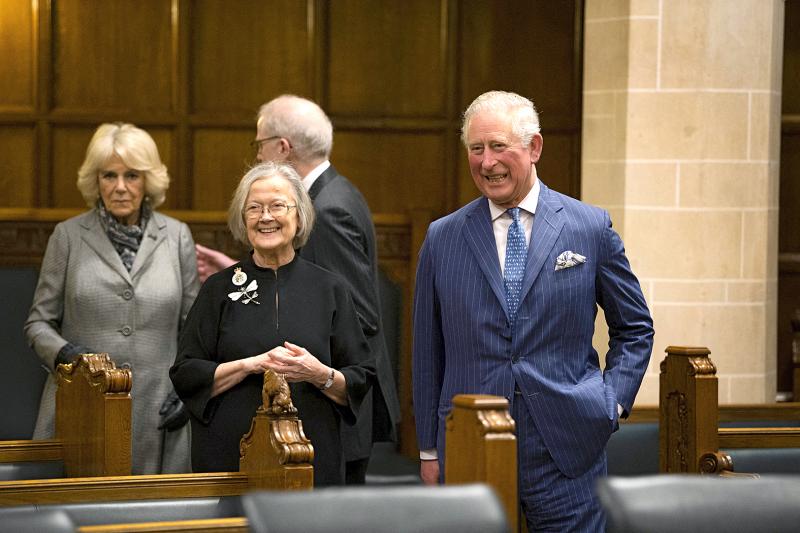A senior British judge has announced she is to quit Hong Kong’s top court when her term ends, adding that there are “all sorts of question marks” over Beijing’s new National Security Law, British media reported yesterday.
Baroness Brenda Hale, the first female president of the British Supreme Court, is one of 13 foreign judges who are non-permanent members of the Hong Kong Court of Final Appeal.
Unlike mainland China, where the courts are beholden to the Chinese Communist Party, Hong Kong’s judicial system remains independent and based on common law — a major reason for its position as a global business hub.

Photo: AFP
Lawyers from common law jurisdictions are able to operate in the territory, while senior judges are invited to sit in its top court, but China’s imposition of the National Security Law last year has sparked concerns in some legal circles about whether judicial independence can be maintained.
The British government is currently reviewing whether to bar its judges from serving in the Hong Kong Court of Final Appeal.
Hale mentioned the impact of the security law as she announced she would not seek a second term in the court when her tenure ends next month, the Times reported.
“The jury is out on how they will be able to operate the new National Security Law. There are all sorts of question marks up in the air,” the Times quoted Hale as telling a videoconference on Thursday. “I don’t wish to be reappointed.”
Hale, who headed Britain’s top court from 2017 to last year, said that there are serious concerns about the law, but argued that the remaining foreign judges were “keeping an eye on what’s going on there,” the Times said.
Once Hale steps down there would be nine British judges in the Hong Kong Court of Final Appeal. The remainder hail from other common law jurisdictions such as South Africa and Australia.
The territory’s top judge, Hong Kong Chief Justice Andrew Cheung (張舉能), has said that the judiciary remains free from political interference.

Auschwitz survivor Eva Schloss, the stepsister of teenage diarist Anne Frank and a tireless educator about the horrors of the Holocaust, has died. She was 96. The Anne Frank Trust UK, of which Schloss was honorary president, said she died on Saturday in London, where she lived. Britain’s King Charles III said he was “privileged and proud” to have known Schloss, who cofounded the charitable trust to help young people challenge prejudice. “The horrors that she endured as a young woman are impossible to comprehend and yet she devoted the rest of her life to overcoming hatred and prejudice, promoting kindness, courage, understanding

‘DISRESPECTFUL’: Katie Miller, the wife of Trump’s most influential adviser, drew ire by posting an image of Greenland in the colors of the US flag, captioning it ‘SOON’ US President Donald Trump on Sunday doubled down on his claim that Greenland should become part of the US, despite calls by the Danish prime minister to stop “threatening” the territory. Washington’s military intervention in Venezuela has reignited fears for Greenland, which Trump has repeatedly said he wants to annex, given its strategic location in the arctic. While aboard Air Force One en route to Washington, Trump reiterated the goal. “We need Greenland from the standpoint of national security, and Denmark is not going to be able to do it,” he said in response to a reporter’s question. “We’ll worry about Greenland in

PERILOUS JOURNEY: Over just a matter of days last month, about 1,600 Afghans who were at risk of perishing due to the cold weather were rescued in the mountains Habibullah set off from his home in western Afghanistan determined to find work in Iran, only for the 15-year-old to freeze to death while walking across the mountainous frontier. “He was forced to go, to bring food for the family,” his mother, Mah Jan, said at her mud home in Ghunjan village. “We have no food to eat, we have no clothes to wear. The house in which I live has no electricity, no water. I have no proper window, nothing to burn for heating,” she added, clutching a photograph of her son. Habibullah was one of at least 18 migrants who died

Russia early yesterday bombarded Ukraine, killing two people in the Kyiv region, authorities said on the eve of a diplomatic summit in France. A nationwide siren was issued just after midnight, while Ukraine’s military said air defenses were operating in several places. In the capital, a private medical facility caught fire as a result of the Russian strikes, killing one person and wounding three others, the State Emergency Service of Kyiv said. It released images of rescuers removing people on stretchers from a gutted building. Another pre-dawn attack on the neighboring city of Fastiv killed one man in his 70s, Kyiv Governor Mykola